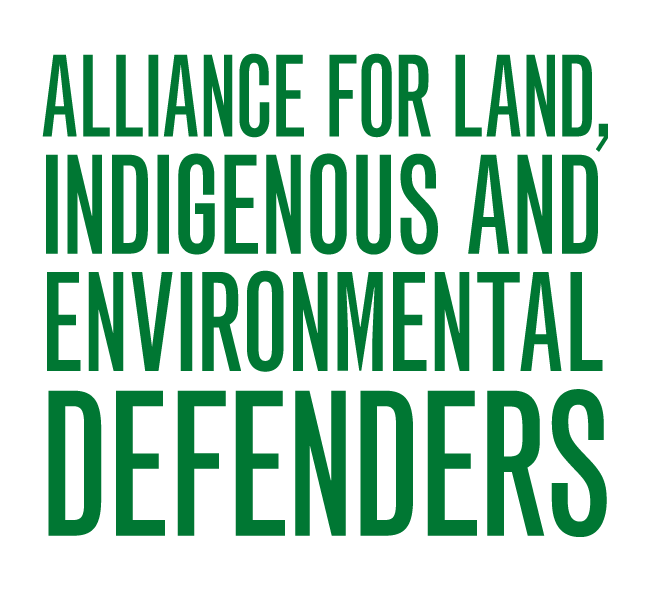LAW AND ADVOCACY
THE LAW AND ADVOCACY WORKING GROUP
The Law and Advocacy Working Group is a group of international, regional and national-level civil society organizations. We have come together to strengthen international and national policy and legal frameworks to secure the recognition and protection of Indigenous, Land and Environmental Defenders (ILEDs) and their work. Through coordinated action and collective efforts, we seek to address the root causes of attacks against ILEDs, including impunity, organized crime and corruption. Jointly with our advocacy efforts, we seek to leverage the law to empower defenders and their communities, and we work with lawyers across the world to secure enhanced access to justice by ILEDs.
Our co-chairs


With the support of defenders from Asia, Latin America, and Africa.
Expanding access to multilateral spaces
Multilateral spaces, such as the United Nations climate change negotiations, can provide an important opportunity for ILEDs to raise the visibility of their cases and engage directly with government decision-makers.
The Law and Advocacy Working Group helps ALLIED members to coordinate their advocacy at significant international events.
We aim to strengthen the capacity of defenders and grassroots organizations to participate in these use and use them effectively to advocate for their interests.
Addressing impunity and corruption
Impunity is a leading driver of violence against ILEDs. Almost all attacks on ILEDs occur with absolute impunity. Because perpetrators of attacks face little or no risk of consequences for their actions, it is often cheaper and easier for them to use violence to silence their critics than it is to engage meaningfully and responsibly with local stakeholders in a way that avoids human rights abuses in the first place.
Likewise, corruption underlies most attacks on ILEDs. Corruption is often at the root of problematic development projects that give rise to community opposition. After attacks occur, corruption often prevents local law enforcement and government personnel from effectively investigating and prosecuting.
The Law and Advocacy Working Group is working collectively to raise the political, economic, legal, and reputational costs that perpetrators face, by helping defenders to access a wider range of accountability tools and strengthen connections with international human rights, anti-corruption, law enforcement, sanctions, and cybersecurity experts.
Stopping the criminalization of defenders
Criminalization–the misuse of the judicial system to attack defenders–is perhaps the most common tactic used to silence ILEDs. This tactic is particularly dangerous because the attacks often masquerade as legitimate prosecutions and lawsuits.
The Law and Advocacy Working Group is documenting the use of criminalization tactics across the world and building a body of knowledge about which defensive strategies work best. We are advocating for recognition of criminalization as a form of human rights abuse for which the victims need to have access to a remedy.
We also provide rapid response support for ALLIED members facing criminalization attacks.
Positioning positive narratives and strengthening communications and advocacy skills
Many attacks on ILEDs have a public communications component. Perpetrators often launch smear campaigns, online or offline, intended to portray defenders as criminals, terrorists, or other threats to society. These smear campaigns then help to justify the use of violence against a defender.
In collaboration with global civil society partners, the Law and Advocacy Working Group has launched a campaign to better equip defenders with the tools they need to defend against harmful smear campaigns and to position positive narratives to educate the public on the important role that ILEDs play.
The Law and Advocacy Working group also organizes and helps to disseminate solidarity campaigns designed to elevate the work and voices of defenders.
ENVIRONMENTAL RIGHTS AGREEMENT IN AFRICA – ERA
In the wake of the climate emergency, environmental rights are critical tools for ensuring African communities are not left out of the environmental and development decisions that will transform the continent in the coming decades. A regional environmental rights instrument offers the opportunity to safeguard Indigenous, Land and Environmental Defenders (ILEDs) and guarantee a just transition.
GUIDE FOR Human Rights DefenderS:
HOW TO ASK FOREIGN EMBASSIES FOR HELP
Embassies can play an important role in preventing or stopping violence against you and other defenders.
They often have direct access to senior government officials and other influential people who might have
the power to stop attacks from happening or who might themselves be involved in the attacks. ALLIED has prepared this guide to help human rights defenders communicate effectively with the foreign
governments that have embassies in your country.
HOW WE WORK
We search for common ground, and we seek to bring the voices of defenders to multilateral and national fora. We are guided by the following principles:
- Long-term commitment
- Strengthening and empowering local and grassroots legal advisors
- Inclusion
- Systemic change
- Solidarity
